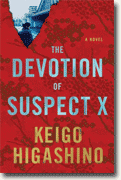The Devotion of Suspect X
Keigo Higashino
book reviews:
· general fiction
· chick lit/romance
· sci-fi/fantasy
· graphic novels
· nonfiction
· audio books
· author interviews
· children's books @
curledupkids.com
· DVD reviews @
curledupdvd.com
newsletter
win books
buy online
links
home
for authors
& publishers
for reviewers

 |
The Devotion of Suspect X Keigo Higashino Minotaur Books Hardcover 304 pages February 2011 |
|
When that abusive bastard of a stalking-mooching ex-husband won’t leave you alone, are you justified in murdering him? That’s precisely the question that is never even once raised in this novel by the bestselling Japanese mystery writer Keigo Higashino.
Yasuko’s next-door neighbor, the high school teacher and mathematician Ishigami, hears the scuffle and steps in to help. He choreographs the perfect crime. Why? Because he’s in love with Yasuko, because he’s “devoted,” as the title suggests. All this we learn in the first couple of chapters. What ensues is an entertaining and escalating mystery featuring prize-winning Higashino’s recurring character, physicist Dr. Manabu Yukawa, known affectionately as Professor Galileo. The two “geniuses” – Ishigami the mathematician and his former classmate, Yukawa – match wits in a case of deceptive appearances that plummets to a dark and bitter conclusion. The Devotion of Suspect X But it’s deeply disturbing that Yauko’s case is only ever considered as a murder. She is questioned by men, very clever ones, and supplied with alibis and scripts that tell her how to respond in every respect to her and her daughter’s interrogations by these clever men. And all of that is schemed up for her by Ishigami, the clever man in love with her. Never once is the possibility raised that there is a completely other way of looking at the case. Indeed, the author seems to set up precisely that scenario in the first few pages. As we witness the confrontation between Yasuko and Togashi, it seems almost inevitable that the author is going to raise the thorny issue of a woman’s right to defend herself against a brutal abuser. Instead, a male comes to her rescue, and Yasuko (who, it is made abundantly clear, is both young and pretty) acquiesces to his plan. It would be easy, too easy, to brush off this feminist critique with some relativizing comment about how Japanese culture is different. Perhaps – but feminism is alive and kicking in Japan, and women are asserting their rights - as in the rest of the world - to be free from violence. That struggle may be more difficult in Japan, which does seem (at least in its popular media) to be obsessed with violence, especially sexual violence. Consideration of the sexual roles of men and women would have made Higashino’s novel something else, of course – and probably not the Japanese bestseller it is. It would have put him more on par with the controversial Susanna Moore (In the Cut) or with Higashino’s own Japanese contemporary, Haruki Murakami, whose considerations of violence have ranged widely from the sexual to the psychological and, most unusually for a Japanese writer, to the cultural in as much as he has written about Japanese war crimes in China during World War II (The Wind-Up Bird Chronicles). As it is, The Devotion of Suspect X Originally published on Curled Up With A Good Book at www.curledup.com. © Brian Charles Clark, 2011 |
|
|
|
 Click here to learn more about this month's sponsor! |
|
| fiction · sf/f · comic books · nonfiction · audio newsletter · free book contest · buy books online review index · links · · authors & publishers reviewers |
|
| site by ELBO Computing Resources, Inc. | |
 Yasuko Hanaoka divorced the bastard (Togashi) then changed jobs and moved to another apartment in order to shake him off. But he tracks her down anyway and, one night at her apartment, he crosses the line, threatening her and her daughter, Misato. The result? A corpse on the apartment floor.
Yasuko Hanaoka divorced the bastard (Togashi) then changed jobs and moved to another apartment in order to shake him off. But he tracks her down anyway and, one night at her apartment, he crosses the line, threatening her and her daughter, Misato. The result? A corpse on the apartment floor.